- NEWS
- Interview with international exchange students
Interview with international exchange students
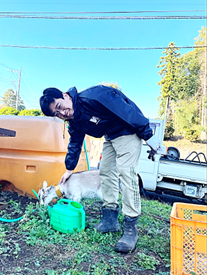
- Posted
- Tue, 30 May 2023
Yuerong CHEN, Jianlun WU and Yaping YE are International Graduate Exchange Students from Zhejiang Chinese Medical University. They shared their experiences of life in Japan and at Waseda University.
Yuerong CHEN
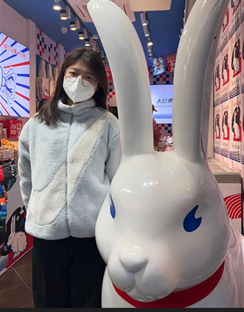
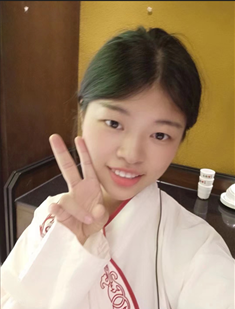
Q1. What made you decide to come to Waseda to study?
The free and strong academic atmosphere of Waseda University attracted me deeply. I was also very happy to meet excellent seniors and students here. I participated in the experiments of some seniors here. I was impressed by their rigorousness and intelligence.
Q2. What are you currently studying at Waseda?
We are studying a combination of computer science and traditional Chinese medicine. Our aim is to try to quantify a part of traditional Chinese medicine, and by taking pulse and other basic information from the subjects, we want to explore whether there is a correlation.
Q3. Please describe one memorable experience with a professor and/or class.
I remember the first time I attended the meeting hosted by Prof. Jin, he could drive every student to speak freely, and everyone in the meeting actively responded, even when the issue jumped to off-campus student lives. He encouraged us to think and speak. We deeply felt the professor’s concern for our lives and his guidance of our academics.
Q4. Tell us about your campus life at Waseda University.
In our campus life at Waseda, we are often immersed in the collection of data on subjects, and such time passes particularly quickly. During the data collection process, I could feel the “mental flow” mentioned in some books. The feeling of focusing on something was especially beautiful and quiet. At the same time, I enjoyed the charming scenery of the campus. I also participated actively in the experiments of many of seniors, which helped me a lot by opening up my mind to research methods.
Q5. How easy or difficult was it for you to meet people and make friends as an international student?
I think it depends on frame of mind and how hard we work or not. As an international student, if we want to make friends, we need to take the initiative to learn the language to cross the language barrier. Besides, we should recognize and understand respect the cultural differences that exist in each country, with an open mind to meet different people and learn different cultures.
Q6. What differences do you perceive between Japanese and Chinese universities?
I think that in Japanese universities, the academic atmosphere is freer and requires a strong self-drive. We need to set our goals early and work hard for them. In addition, life at a Japanese university may require more independence, as most people live independently, and you need to pay attention to matters of life and school email notifications on your own.
Q7. How would you describe the dorm life – rooms, dining options, location, social opportunities?
Since I don’t live in a dormitory, but in a rental apartment near the school, so I don’t know much about dormitory life. The house I live in has all the amenities, a convenience store nearby, and is close to the subway station, but since I live alone, I have fewer opportunities to socialize.
Q8. What surprised you the most when you came to Japan?
What surprised me the most was that the social welfare in Japan is very good, and international students can enjoy the same medical insurance as residents. In addition, the students are very capable of independent research.
Q9. What did you gain from studying at Waseda University?
We need to always ask ourselves what we really want inside, and work hard for it, instead of easily going with the flow.
Q10. What are your plans and outlook for the future?
I want to further my specialty in acupuncture and strive to try cross-disciplinary projects as well. My next concrete plan is to obtain a doctorate in acupuncture and actively go to clinics to continuously improve my clinical skills in acupuncture. I want to be a person of value and bring help to society and others.
Mr.Jianlun WU

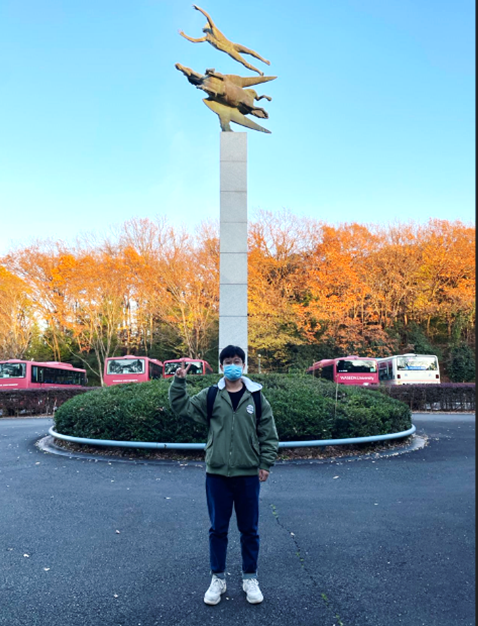
Q1.What made you decide to come to Waseda to study?
I am truly honored and grateful to have been given the opportunity to participate in this exchange study program at Waseda University. From the moment I first learned about Waseda University, it has been my dream to study at this prestigious institution known for its excellence in education. The school of Human Sciences aligns well with my research interests in Preventive Treatment and Health Management, making this the perfect opportunity for me to further my academic research capabilities and explore human health from a multidisciplinary perspective. I was fortunate enough to have taken online exchange courses from Waseda University before, and the knowledge and experience I gained from those courses motivated me to take this next step. Now, after having studied at Waseda University for more than three months, I can say with certainty that this opportunity has been invaluable. The university and the professors not only have provided me with an immense amount of professional knowledge but also given me experiences that will be useful to my career in future. I am truly grateful for the experience and the chance to be part of the Waseda University community.
Q2 What are you currently studying at Waseda?
I am honored to currently be studying in a groundbreaking project participated by Professor Jin Qun, Professor Shoji Nishimura, and Professor Atsushi Ogihara. The project aims to use an interdisciplinary approach to better understand how data can be utilized before disease onset and develop a personalized health promotion model based on the traditional Chinese medicine principle of “treating before illness”. The research includes the use of traditional methods in TCM such as “inspection, auscultation, inquiry, and palpation” in conjunction with the latest technology such as AI wearables to gather health data, which will then be analyzed using cutting-edge machine learning techniques. Together, we will take a multilateral and comprehensive approach to tackle many important questions, with the ultimate goal of improving personal health outcomes.
Q3. Please describe one memorable experience with a professor and/or class.
One of my memorable experiences was participating in a sweet potato-digging project with Professor Atsushi Ogihara. It was a unique experience that not only gave me the opportunity to experience the process of digging sweet potatoes but also to understand the larger purpose of the event, which is to donate sweet potatoes to local organizations that help children and people with disabilities. Professor Atsushi Ogihara also demonstrated his humanistic spirit and taught us the importance of striving for something more than ourselves. This experience was not only academically beneficial, but it also helped me understand the work and mission of the organizations receiving the sweet potatoes, which has had a positive impact on my academic experience and my interest in Professor Atsushi Ogihara’s field of study.
Q4. Tell us about your campus life at Waseda University.
As an exchange student at Waseda University, I am honored to have had the opportunity to immerse myself in the academic and extracurricular experiences the university has to offer. I have spent much of my campus time in the lab, library, and seminars, which makes me gain a deeper understanding of my field of study. Along with that, I have been fortunate to participate in various interesting research such as the “a sweet potato-digging” project led by Professor Atsushi Ogihara, and participated in “Countryside Stays Japan” to support the development of local communities. I couldn’t be more grateful for the diverse study and research methods, range of opportunities, and support the university has provided in making my experience at Waseda enjoyable and successful.
Q5. How easy or difficult was it for you to meet people and make friends as an international student?
It can be challenging for me to meet people and make friends at first, as I am in a new environment with a different culture, language, and customs. However, there are many opportunities at Waseda University for me to meet and connect with local students and other international students. As I mentioned above, I have attended programs on campus or in the local community and participated in some interesting experiments conducted by local student and international students. Additionally, Waseda University provides a lot of resources and support for international students, including holding a student exchange meeting to assist us with meeting people and making connections, etc. And professors and classmates are also very amiable, and they often try their best to solve problems enthusiastically. So now I have become good friends with many local classmates as well as international students.
Q6. What differences do you perceive between Japanese and Chinese universities?
From my experience studying at Waseda University, I can say that there are significant differences between Japanese and Chinese universities. One of the most notable differences is the emphasis placed on independent learning and research. Universities in Japan, such as Waseda, often place a great emphasis on independent study and research, and students are expected to take a more active role in their own learning. On the other hand, in Chinese universities, most professors tend to take a more prescriptive approach, with students being asked to conduct research as part of predefined projects. Another difference is the emphasis placed on extracurricular activities. Japanese students have many opportunities to participate in activities such as clubs, sports, and volunteer work, which are often seen as an essential component of a well-rounded education, and greatly beneficial in terms of building interpersonal relationships and developing soft skills. However, Chinese universities tend to offer fewer extracurricular activities. Lastly, the campus culture and atmosphere may also be quite different. Universities in Japan tend to have a more relaxed and laid-back atmosphere, while those in China tend to be more serious and tense.
Q7. How would you describe the dorm life – rooms, dining options, location, social opportunities?
Although I personally did not experience it, I have heard from my friends at Waseda University that the living conditions in the dorms are top-notch. They said that the facilities are well-maintained, clean, and comfortable in the dorm. Additionally, the dorms offer a great sense of community and provide ample opportunities for socialization and networking with other students from diverse backgrounds. They also said that the dorm staffs are friendly and helpful with any questions or concerns they have. Based on their shares, I have a strong impression that Waseda University places a high priority on ensuring that students have a positive dormitory living experience.
Q8. What surprised you the most when you came to Japan?
When I first came to Japan, I was most surprised by Japan’s culture of politeness and respect. Locals are very polite and helpful, and there are many customs and social norms that emphasize respect for others. I was also struck by the level of cleanliness and order in the country. Japan is known for its strict laws and regulations on littering, and the streets and public spaces are incredibly clean. Additionally, I was fascinated by the variety and quality of traditional Japanese food, such as sushi and ramen.
Q9. What did you gain from studying at Waseda University?
As an exchange student at Waseda University, I gained a wealth of knowledge and experiences that will be valuable for my future academic and career aspirations. I had the opportunity to study and participate in research projects in my field of interest, which helped me to deepen my understanding of the subject matter and to develop my research skills. Additionally, I also participated in a variety of activities such as cultural events and interesting research experiments, which helped me to learn more about Japanese culture and to make connections with other students from diverse backgrounds. Furthermore, living in Japan, one of the most developed counties in the world, gave me a chance to learn and explore new cultures, food, and custom. The experience of studying in a different country and adapting to a new environment also helped me to become more independent, open-minded, and adaptable. Overall, my exchange study at Waseda University was a truly valuable and enriching experience and one that I will treasure for the rest of my life.
Q10. What are your plans and outlook for the future?
My plan for the future is to become a highly skilled and internationally-oriented healthcare practitioner in the field of “preventive medicine” and health management, with a strong background in traditional Chinese medicine. My research direction is focused on “disease prevention” and health management, I believe this direction not only is my favorite but also has a strong vitality and good development prospects in the future. In the short term, during my graduate studies, I plan to focus on solidifying my understanding of my field, keeping up with current research trends, and improving my academic research skills. In the long term, I plan to continue my education, with an emphasis on interdisciplinary research and international communication, to give my best contribution to the healthcare development of China. Furthermore, I am honored to have the opportunity to Waseda University in Japan for a study and exchange program for better improving my ability to communicate with people from different cultural backgrounds and acquire more knowledge about the developed health management industry in Japan. I believe through participating in this exchange program and eventually become a high-level internationally-oriented talent with a global vision and abilities of international communication and competitiveness.
Ms.Yaping YE
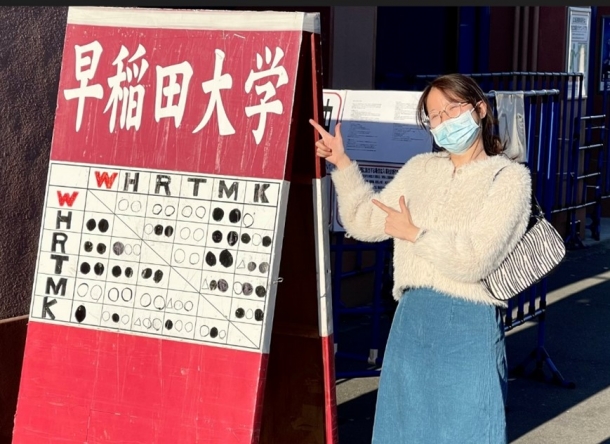
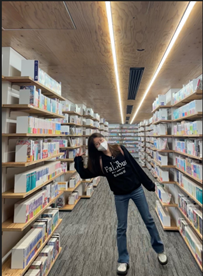
Q1.What made you decide to come to Waseda to study?
As an exchange student at Waseda university, I would like to thank the university for giving me this opportunity. Waseda University is very famous in China for its beautiful environment and good study atmosphere, and I think it is very important for me to come to Waseda to have a different experience.
Q2.What are you currently studying at Waseda?
Recently, I am conducting an experiment under the guidance of Prof. Jinqun, during which I am learning about the design and conduct of experiments, mainly by distributing questionnaires to designated participants.
Q3. Please describe one memorable experience with a professor and/or class.
When it comes to the most memorable activity, I would say the farming activity that Prof. Ogihara took us to. It was my first experience digging sweet potatoes and I learned how hard it is for farmers. During the activity, the Prof. told us that he would donate some of the sweet potatoes to the children’s canteen, and I felt the humanism of a scholar.
Q4. Tell us about your campus life at Waseda University.
The campus life at Waseda University is fulfilling. Within the first few days of arriving at the school, I was fascinated by the beauty of the school and wandered all over the campus. It took me a week to get used to the campus life here, and immediately afterwards I participated in the teacher’s experiments. I also participated in very many practical activities after school and made many friends. The campus life at Waseda University must be a wonderful memory for me.
Q5. How easy or difficult was it for you to meet people and make friends as an international student?
Since I can’t speak Japanese, this has affected me to make friends to some extent. But the good thing is that my Japanese classmates were very friendly, and they were very happy to communicate with me in English, so I made several Japanese friends.
Q6.What differences do you perceive between Japanese and Chinese universities?
Compared to the university I attended in China, I think Japanese universities have a more liberal learning atmosphere and better facilities, and during my time here, I have felt that the university pays more attention to students’ learning needs.
Q7. How would you describe the dorm life – rooms, dining options, location, social opportunities?
I live in a rented house, it is a small room but I have made it very cozy and I really like my little room. As for me, the dining options are too few. I prefer to eat food cooked by myself.
Q8. What surprised you the most when you came to Japan?
Japanese have surprised me a lot. The Japanese people were very friendly to us and very willing to help us when we were in trouble. We once met an elderly Japanese man at dinner who said to us in Chinese, “I hope the two peoples will have friendly relations for generations.” At that moment, I was very moved.
Q9. What did you gain from studying at Waseda University?
The most noteworthy thing is that I have gained many friends, and the memory of studying here is very valuable.
Q10. What are your plans and outlook for the future?
After I return to China, I will continue my further studies. If things go well, I will become a university teacher after graduation. Outside of teaching, I will spend most of my time traveling, and my goal is to travel the world. Maybe I will come back to Japan and live here again someday.
